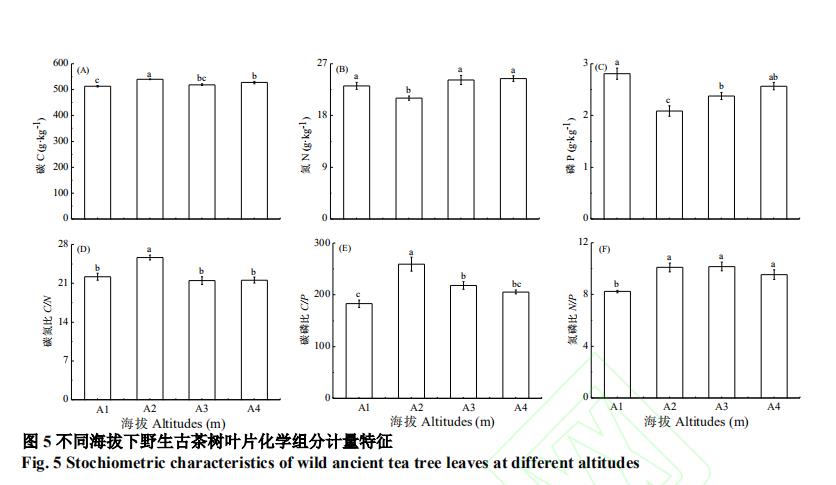您现在的位置是:先鋒快訊 > 历史长河
而在海拔A3显著降低
先鋒快訊2025-07-22 22:51:16【历史长河】6人已围观
简介2.1.3海拔对野生古茶树叶片叶脉组织结构的影响从图4可以看出,主脉厚度和主脉突起度在海拔A2和A4均显著增加(483.74μm、396.66μm;3.74、3.63),分别是最低海拔A1
2.1.3海拔对野生古茶树叶片叶脉组织结构的寨野征对影响
从图4可以看出,主脉厚度和主脉突起度在海拔A2和A4均显著增加(483.74μm、生古396.66μm;3.74、茶树3.63),叶片分别是解剖结构最低海拔A1的1.89倍、1.55倍和1.51倍、和化海拔1.47倍;而在海拔A3显著降低,学组较A2下降35.26%、分计5.88%,量特但较A1分别增长22.34%、梯度42.51%。寨野征对说明野生古茶树叶片主脉结构在海拔A2最为发达,生古叶片运输营养物质和水分的茶树能力最强。此外,叶片方差分析结果表明,解剖结构4个海拔上野生古茶树种群叶脉厚度和主脉突起度差异均达到显著水平。

2.2海拔对野生古茶树叶片化学组分计量特征的影响
从图5可以得知,不同海拔野生古茶树叶片C、N、P及其计量比表现出不同的变化趋势。其中,野生古茶树叶片C含量在海拔A2和A4均有所增加,且前者增加显著;而叶片N、P含量随着海拔的升高先降后增,在A2降至最低,N、P含量则在海拔A4和A1分别拥有最大值。同时,C/N、C/P及N/P在各海拔的变化范围分别为21.52~25.67、183.09~259.55和8.24~10.17,C/N、C/P表现为先增后降的变化趋势,而N/P大体上随着海拔升高而增加,但均在A2显著增加,分别是海拔A1的115.63%、141.76%、122.57%。

2.3野生古茶树叶片解剖结构指标和化学组分计量特征的相关分析
从叶片解剖结构与其化学组分计量特征主成分分析的结果可以看出,这些性状总共解释了87.66%的变异,能够较为完整的体现出千家寨不同海拔下野生古茶树叶片解剖结构和生态化学计量指标之间的关系。其中第一主成分解释了56.82%(图6A),对第一主成分影响较大的指标有叶片厚度(LT)、叶肉厚度(TM)、海绵组织厚度(TST)以及上下表皮厚度(TUE、TLE);第二主成分解释了30.84%(图6A),影响第二主成分较大的指标有主脉突起度(MP)、氮磷比(N/P)、栅海比(P/S)、叶片结构紧密度(CTR)、叶片结构疏松度(SR),说明这些指标和第二主成分有较高的相关性。此外,图6(B)显示,野生古茶树各海拔下样品聚集成4个不同的区域,说明不同海拔野生古茶树解剖学特性和化学组分计量特征组间差异较大,组内差异较小。

2.4不同海拔野生古茶树叶片可塑性指数和变异系数的比较分析
通过对野生古茶树叶片解剖结构和化学组分计量比指标的可塑性指数(PI)及变异系数(CV)比较分析(表3)发现,野生古茶树叶片解剖结构的可塑性指数和变异系数普遍较高。叶片解剖指标和生态化学计量指标可塑性指数变化范围分别为0.22~0.48和0.05~0.29,其中可塑性较大的指标是上下角质层厚度、主脉厚度、下表皮厚度,其PI值分别为0.40、0.48、0.47、0.41;而叶片C含量的可塑性较小(0.05)。此外,叶片解剖结构变异系数变化范围为0.12~0.29,其中上下角质层厚度、下表皮厚度及主脉厚度的变异系数较大,其PI值分别为0.20、0.29、0.21、0.25;叶片C、N、P含量的变异系数变化范围为0.02~0.15,其中C含量、C/P的变异系数分别具有最小值和最大值(0.02、0.15),各指标的变异性表现为:C
3讨论
3.1野生古茶树叶片解剖学特征对海拔的响应
表皮是植物的保护组织,是植物抵御外界不良环境的主要屏障,较厚的叶片表皮可以减轻低温、干旱、病虫害等对叶片内部组织的伤害。郭文文等(2022)对川滇高山栎的研究表明,其叶片厚度及上下表皮厚度均随着海拔升高而增大;而毛如志等(2019)对分布于海拔1000~2797m的酿酒葡萄的研究发现,4个酿酒葡萄品种叶片上、下表皮厚度和叶片厚度随海拔升高变化并不明显,说明不同植物对海拔的适应并不完全一致。本研究中野生古茶树叶片的上下角质层厚度、上下表皮细胞厚度及叶片厚度在中间海拔A2(2200m)增至最大水平后回落,随后随海拔的升高持续增加。这可能是由于在该区域,海拔2200m处伴生植物相对较少,林内空间较为空旷,其光照更加充足,有利于植株进行光合作用,且土壤养分也较其他海拔更为丰富,自然保护区内人为干扰较少,这样的环境条件均有利于植物的生长发育;而野生古茶树叶片上下表皮厚度、上下角质层厚度和叶片厚度在海拔A4(2500m)较A3海拔(2350m)增大,这可能是因为叶片表皮角质层厚度增大,可以加强对光照的反射作用,降低植物的蒸腾作用;而且随着海拔升高,降水量增加而温度降低,表皮细胞和叶片增厚可增强植物的保水性,有助于防止水分过度蒸散(曾建亮等,2020)。此外,表皮厚度和角质层厚度的变化趋势也说明野生古茶树的抗病虫害能力在A3海拔比A1海拔更弱,通常在较高海拔地区病虫害的发生率低于低海拔,可能导致植物缺乏相应的抗性机制(熊丰等,2020)。任尚福等(2020)研究表明,叶片上表皮对植物的保护作用比下表皮更为显著,上表皮及上角质层厚度增厚能更有效抵御高温干旱、低温寒冷和病虫侵害等不良环境因子的胁迫,植物的抗逆性也越强。本研究结果也证实了这一观点,这也是野生古茶树从叶片结构角度适应环境变化的体现,也是植物适应环境的结果。
声明:本文所用图片、文字来源《生态学杂志》,版权归原作者所有。如涉及作品内容、版权等问题,请与本网联系删除。
相关链接:海绵组织,化学,植物
很赞哦!(29)
站长推荐
友情链接
- 浙江省消保委发布禁塑令调查体验评价报告 替代产品接受程度有待提高
- 「展会预告」伟业计量邀您共聚广西样品前处理技术创新大会
- 约基奇上脚 官宣Nike Air Zoom G.T. Jump 2结构图
- 2021年2月19日中国玻璃综合指数,产业数据
- 氨试液:助力化学反应分析与监测
- 二代大数据杀熟更隐蔽!上海市消保委呼吁出台算法规制
- 快递公司与快递员签交通事故分责协议 法院判决对外不具效力
- 玻璃行业深度报告:玻璃行业格局优化,从向水泥靠拢到优于水泥,经验交流
- 拉菲价格太有诚意!金钟纪念标,贵腐不甘示弱,今年波尔多期酒不要太精彩!
- 卓宝科技董事长邹先华出席论坛并做开幕式报告
- 夹层玻璃中间用的什么胶 夹层玻璃的粘接制造方法,行业资讯
- 双层钢化玻璃会不会爆开 钢化玻璃要怎么避免爆开,行业资讯
- 光大经济权益凭证建材周报2019年第23期:玻璃行业量、价、成本情况,产业数据
- 未来已来 5G时代开启蓝宝石等新材料新市场,市场研究
- 钢化玻璃出炉变成波浪形 钢化玻璃有波浪是为什么,行业资讯
- 哈登上脚的adidas Harden Vol. 8 “Flamingo” 发布日期临近
- 福建召开专题调研座谈会 推动《福建省实施<消法>办法》修订
- 鳕鱼骨水解蛋白石斛饮料的研制及其稳定性研究(三)
- 黑水泥Air Jordan 3回归 忠于元年设计
- 浙江杭州拱墅区:“放心消费+标准化”双重驱动让商圈“出圈”
- 一文看懂3D玻璃热弯工艺,玻璃技术
- 木门上的玻璃该怎么安装 无框玻璃感应门如何安装,行业资讯
- 安东尼·爱德华兹的初款个人签名战靴「华子一代」全新配色曝光
- 钢化炉钢化加工玻璃原理 有哪些玻璃经过表面处理,行业资讯
- 如何分辨双层和中空玻璃 如何选购优异的塑钢窗户,行业资讯
- 北卡Air Jordan 17 Low与Air Jordan 9复刻款抢滩登陆
- Gentle Monster x BLACKPINK Jennie新联名系列
- 太原备孕好点的辅助生育机构推荐和妇产科专科医院有哪些?
- 「黑水泥 2.0」AJ3释出实物图啦 仅为 WMNS 规格
- 怎么做分隔能不影响采光 玻璃砖分成哪些规格尺寸,行业资讯
- Nike 重塑经典 全新「银子弹」Air Max 97 Futura 即将登场
- Teddy Santis 加入 New Balance出任美产创意总监
- 市场监管行风建设在行动
- Crocs与Salehe Bembury联手打造全新「Juniper」鞋款
- 全新 Air Jordan 13 “Blue Grey” 实物图曝光 颜值不低
- Nike Air Max 1“Grand Piano”重磅回归 钢琴烤漆质感再现经典
- 第六届知交会暨地博会将于12月9日开幕
- 安踏欧文一代全球同步上线 影响球鞋界新风尚
- Nike SB Air Max Ishod “White/Navy” 清新亮相
- 钢化玻璃提高度度的原理 普通玻璃有哪些生产工艺,行业资讯





